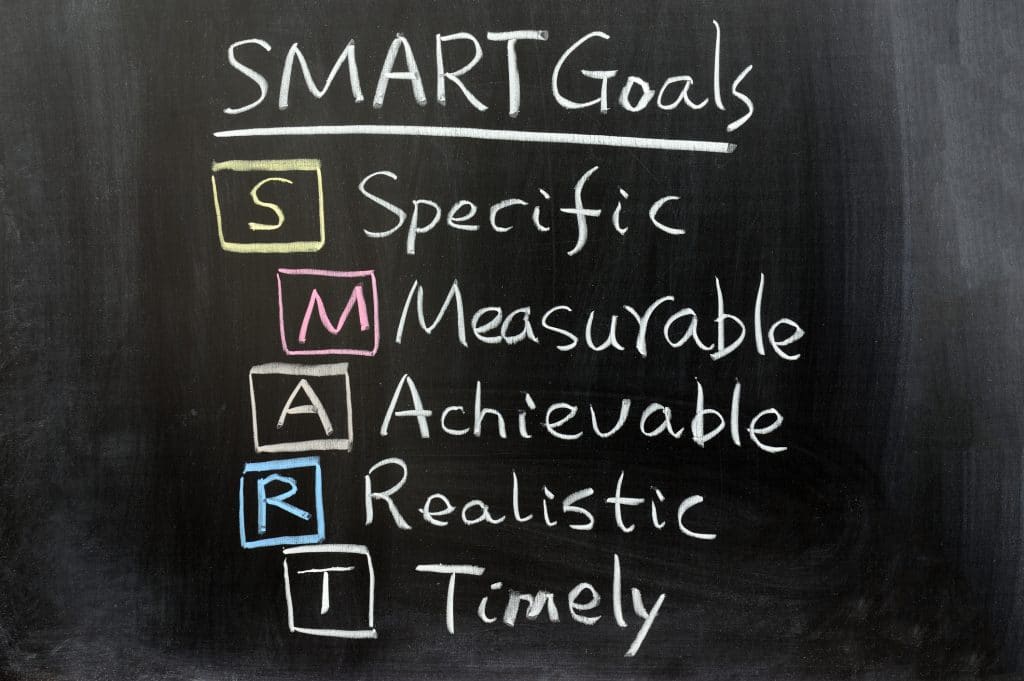Setting goals is the first step to living your dream life.
As an entrepreneur, learning how to effectively set goals will make a huge difference to your level of success.
I used to hate the idea of setting goals. Because I would associate goals with failure. But if you set goals correctly, it'll revolutionise your growth.
“A goal without a plan is just a wish.”
Antoine de Saint-Exupéry
We've all made the mistake of writing an endless list of new years resolutions with no plan for achieving them, only to be writing the same things down a year later.
This is common when you don't understand what the 3 different types of goals are, how to set effective goals, and how to set SMART goals.
I hope this blog post can help you learn more about setting effective goals, what the 3 types of goals are, and how to achieve different personal and professional goals.
Key takeaway
Goal setting can be highly effective if done right. Learn how to set specific, measurable, achievable, realistic and timely goals using the SMART method.
Navigation
What is goal setting?
What is goal setting and why is setting goals so important?
Well, creating a goal is really just naming how you want your future to look. Whether it's a financial, health, personal or professional goal, they're generally moments you envision yourself living in the near future.
By setting the goal, you can begin manifesting that future into existence. You have something to work towards.
These are just some of the major benefits of goal setting.
- Increased focus and vision for the future
- Inspiration and motivation
- Increased productivity (check out more productivity hacks here)
- Provides you with a purpose to keep moving forward
- Makes you consider what matters to you most
- Specific moments to celebrate and reward yourself when you achieve them
How to set effective goals that transform your life
Effective goals make a genuine impact on your well-being.
Think about it, you're much more likely to work hard to achieve a goal you care about. Setting arbitrary goals that sound impressive to other people but you couldn't care less about is a pointless task.
Each goal needs to serve a purpose. A ‘why' and a reason to hold onto when times are tough and you feel like giving up on your goal.
Think about all the different areas of your life and what parts are doing well, versus what is lacking. Once you know what you want to change, you're well on your way to learning how to set effective goals. Next, we're going to learn what are the 3 types of goals, and how to set SMART goals.
What are the 3 types of goals
There are many different types of goals and ways to categorize them. If you ask a group of people ‘what are the 3 types of goals?' you'll probably get a mixture of answers.
Some people break up their goals into short, medium, and long-term. You can learn more about this here.
Others prefer to categorize their goals into personal goals for work, relationships, and health.
I think the categories that matter most are the ones that actually help you achieve them. For me, these are process, performance, and outcome goals, which I'll explain in more detail below.
Most importantly though, is that you use a combination of all of these tips to reach the goals that matter most to you.
1. Process goals

Process goals are the goals in which we perfect our skills, strategies, behaviors, and techniques so that we can achieve the things we wish.
They're not tied to a specific win, such as getting a promotion or winning a race.
Instead, they prepare us for success in these goals, such as improving our communication skills, or running daily so that we can one day win the race or get the promotion.
Process goals can be harder to measure and require a lot of discipline, but they are what support our performance goals and ultimately achieve our outcome goals.
Examples of process goals
- Exercise 5 times a week
- Start work an hour earlier every day
- Reach out to 10 new clients a week
- Post on social media daily
How to set process goals
- Break down your major goals into specific stepping stones and daily habits.
- Work on these goals consistently and increase them gradually as they become more manageable so that you're always pushing yourself. Eg, once you have mastered half an hour of exercise a day, increase it to a full hour.
- Check in on these goals regularly to make sure they're supporting your performance and outcome goals. Adjust them as frequently as needed.
Top tip for achieving process goals:
Consistency is key here, so try to make them as routine as possible and grow positive habits. If you need any inspiration, check out Atomic Habits by James Clear.
“Setting goals is the first step in turning the invisible into the visible.”
Tony Robbins
2. Performance goals

Like progress goals, performance goals are like the stepping stones that get us closer to our final outcome. However, they're more results-based and easier to measure.
If, for example, your outcome goal was to lose weight. Your progress goal would be to consistently work out and eat well, and your performance goal might be to lose 5 pounds every month.
Your performance goals give you something specific to work towards to keep you on track so that you can measure the success of your process goals, and get closer to your final outcome.
Examples of performance goals
- Get five new sales a month
- Hire two new team members a year
- Grow your social media accounts by 5% a week
How to set performance goals
- Work out how you can measure your process goals so that they're getting you closer to your outcome goals.
- Create a realistic timeframe in which you can reach each performance goal and check in on specific dates to monitor your progress.
- Adjust and improve your performance goals as you reach them so that you're continuously getting closer to your final outcome.
Top tip for achieving performance goals:
It can be tempting to make our performance goals too ambitious because we're in a rush to achieve our final outcome. However, building up the momentum by achieving smaller, more realistic goals in the timeframe we set makes it easier to stick to our process goals and keep up the habits that ultimately get us closer to the final outcome.
“Goals are the fuel in the furnace of achievement.”
Brian Tracy
3. Outcome goals

Outcome goals are often seen as the most exciting.
They're the goals that put into words your dreams for the future. They're less about how to get there and the plan to achieve them (that's why we have performance and process goals) and more about the end result.
For example, you may have a process goal of getting better at your job every day and a performance goal of getting a promotion. Ultimately, that is all because your outcome goal is to retire early.
One doesn't work without the others. Just saying ‘I want to retire early' won't make it happen. Equally, saying ‘I want to get better at my job' or ‘I want a promotion' won't happen without knowing the reason you're doing it for.
Examples of outcome goals
- Retiring at 40 years old
- Making a million dollars
- Paying off your mortgage
- Being physically fit
- Selling your business
How to set outcome goals
- Visualize your dream life and what that looks like to you. Work out what is missing and would need to be achieved to create that – they're your outcome goals.
- You can have as many outcome goals as you like, but try not to actively work on too many in one go as that will dilute your efforts and make it harder to achieve any of them. Try to focus on the ones which will make the biggest impact on your life at this current point in time.
- Break your outcome goals into steps and create a timeline to achieve them in – your performance goals. Then work out what will be required to hit those targets – your progress goals.
Top tip for achieving outcome goals:
Let your goals grow with you. One thing which can impact your success rate is wanting different things from when we first set our goals.
If your goals no longer make sense to you, then why would you work hard to try to achieve them? Continuously revisit your outcome goals and edit them to exactly what you want, as often as needed.
“Rowing harder doesn’t help if the boat is headed in the wrong direction.”
Kenichi Ohma
Start creating SMART goals

Now you have learned how to create the different types of goals: process, performance, and outcome. Next, you need to learn how to write goals down in a way that will help you to achieve them.
Psychology professor Dr. Gail Matthews claims that you are 42% more likely to succeed simply by learning how to write goals down.
One important factor in writing out your goals is to review them all with the SMART goal methodology, which is a popular acronym using the following five descriptors:
- Specific
- Measurable
- Achievable
- Relevant
- Time-bound
Before you start working towards any of your goals, check that they're SMART first, and even better, write all of this down to turn your goal into a plan.
Specific
If your goal isn't specific enough then you won't even know whether you have achieved it or not.
Make all of your goals as specific as possible, and then amend them whenever you need.
Replace “I want to get better at languages” with: I will learn conversational German.
Measurable
Both your outcome and performance goals must be measurable so that you know exactly how to tell when you've achieved them.
Replace “I want to run faster” with: I will be able to run 5k in 10 minutes.
Achievable
Setting goals that are not achievable is extremely disheartening, and will negatively impact your motivation for goal setting in the future.
Achievable goals are:
- In your control. You cannot work on goals that are reliant on other people and external forces – focus only on where you can make a difference.
- Realistic. I encourage you to make your goals ambitious, but if you know deep down something isn't possible then choose something else's to work towards. Why is it important to set realistic goals? Because ultimately you will only achieve what you believe is possible.
Replace “I want to be a billionaire” with: I will invest 10% more of my income year on year.
Relevant
Your goals need to be relevant to you and your circumstances.
Relevant goals make sense for the following reasons:
- They fit with your other goals and don't contradict them
- This is the right time in your life to be working towards them
- They will better your life in some way
- They feel meaningful and important to you
Replace “I want to get a new degree” with: I'm going to study for a part-time, online degree alongside my job.
Time-bound
In my opinion, this is one of the most important aspects of creating SMART goals.
If you don't set a time frame for your goals, they'll probably never get done.
Always decide exactly when you would like to have achieved your outcome goal, and then set performance goals to monitor the process along the way.
Replace “Save more money” with: Save $5,000 in twelve months.
“Someday is not a day of the week.”
Janet Dailey
Top tips for achieving your goals
- Reward yourself little and often. People need to be rewarded for hard work, so motivate yourself with small rewards along your journey, such as each time you hit a performance goal.
- Get an accountability partner. Make sure you've got somebody to answer to if you find yourself slacking.
- Review, review, review! Decide how often you will check in on your goals and set reminders on your phone to make sure you don't forget.
- Make goals that excite you. If you don't get butterflies when you're thinking about your goals, then you're probably not going to work late into the night to achieve them.
- Learn how to write goals down. Until your goals are written down, they are just floating around your mind. Once you know how to write goals down effectively you won't go back.
FAQ about goal setting
How many goals should you set at once?
Setting too many goals will make it impossible to keep up with them all, and once you've given up on one it's easy to let the others fall apart too.
Not setting enough goals can make you lose focus, get lazy, and complacent.
Try to have at least three main goals you're working on in one go, that all complement each other nicely.
What goals should I set for myself?
Nobody other than you knows what goals you should set for yourself.
Simply visualize the kind of life you want and work backward from there.
You can also try splitting up your goals into specific categories such as professional goals/financial/religious/health/relationships and entrepreneurship goals to help you get more specific about what you want to work on.
You can then get even more specific, such as, ‘personal goals for work' or ‘financial goals in my relationship'.
What are professional goals?
Professional goals are those related to your work-life, income, or finances.
If you're in employment, these could be: to work hard at your job, retrain, learn new skills or get a promotion.
If you work for yourself, your professional goals may be: attaining a better work-life balance, financial targets, expanding your team, or creating something (such as a book, course, or video).
Whatever your professional goals are, they should always align with your overall happiness.
Should I write down my goals?
It's important to know how to write goals down in a way that makes them feel more like a plan than a dream. Writing down your goal is a great way to cement it into your mind, and make it feel official.
It also gives you some physical proof to look back on, so it's kind of like a promise to yourself.
If writing is not your thing, decide on a different method to record your goals.
You could leave voice notes for yourself, create videos, make mood boards, or simply visualize them. Whatever works best for you is fine!
Why is it important to set realistic goals?
If your goals are not realistic enough then you're setting yourself up to fail.
That doesn't mean don't dream big, in fact, you should be dreaming very big if you know you're dedicated enough to reach those big goals.
Realistic goals checklist:
- The goal is fully within your control.
- Your goal is physically possible.
- The goal is not reliant on something statistically unlikely (eg, winning the lottery).
- Your goal doesn't depend on anybody but yourself.
Final words
I have personally found that learning how to master my goals, how the 3 types of goals works, and how you can create SMART goals, have really spiked my growth both in business but also personal life.
I especially recommend all entrepreneurs to use this method, because we can easily get carried away with unrealistic and impractical goals that just lead to disappointment.
Whether you have personal or professional goals you want to achieve, nothing is stopping you from getting closer to them right now.
As they say, never put off until tomorrow what you can do today.
The feeling you get when you surpass a goal is all the inspiration you need for reaching more and becoming the architect of your life.
What method do you use for setting and achieving goals? Will you be trying out any of these tips?
Let me know in the comments below.




I’ve been setting new-years resolutions for years now that I never seem to achieve and then feel down about not achieving them. Creating SMART goals just makes so much sense and actually seems doable! This is truly inspiring and I feel like I can achieve them by going about it in this way. Thanks for the share!
So inspired to set new goals and do them. This is graet advice 10/10. Thanks Johannes you a real mentor and inspiration to me.
This article will help with increasing success levels and I can’t wait to start applying these principles of setting goals to my work and personal life. 10/10 must read
Super with agree. 100%. meaaesurable and realistic goals so imprtant.
This was a great read about mastering goals. Such clear and actionable advice. I appreciate the emphasis on the importance of setting SMART goals and breaking down larger goals into smaller, manageable steps. Overall, a great resource
I love what you said about “When setting goals as an entrepreneur, it’s important to ensure that they are specific, measurable, achievable, relevant, and time-bound”. this is soooooo important and needs to be established for success to be measurable and achievable as an entrepreneur.
Johannes clearly understands the challenges that entrepreneurs face when it comes to setting and achieving goals! They arn’t always easy! Thanks Johannes for providing insightful and helpful tips and advice on how to set realistic, measurable, and achievable goals that align with my vision and values. 100% upvote :)